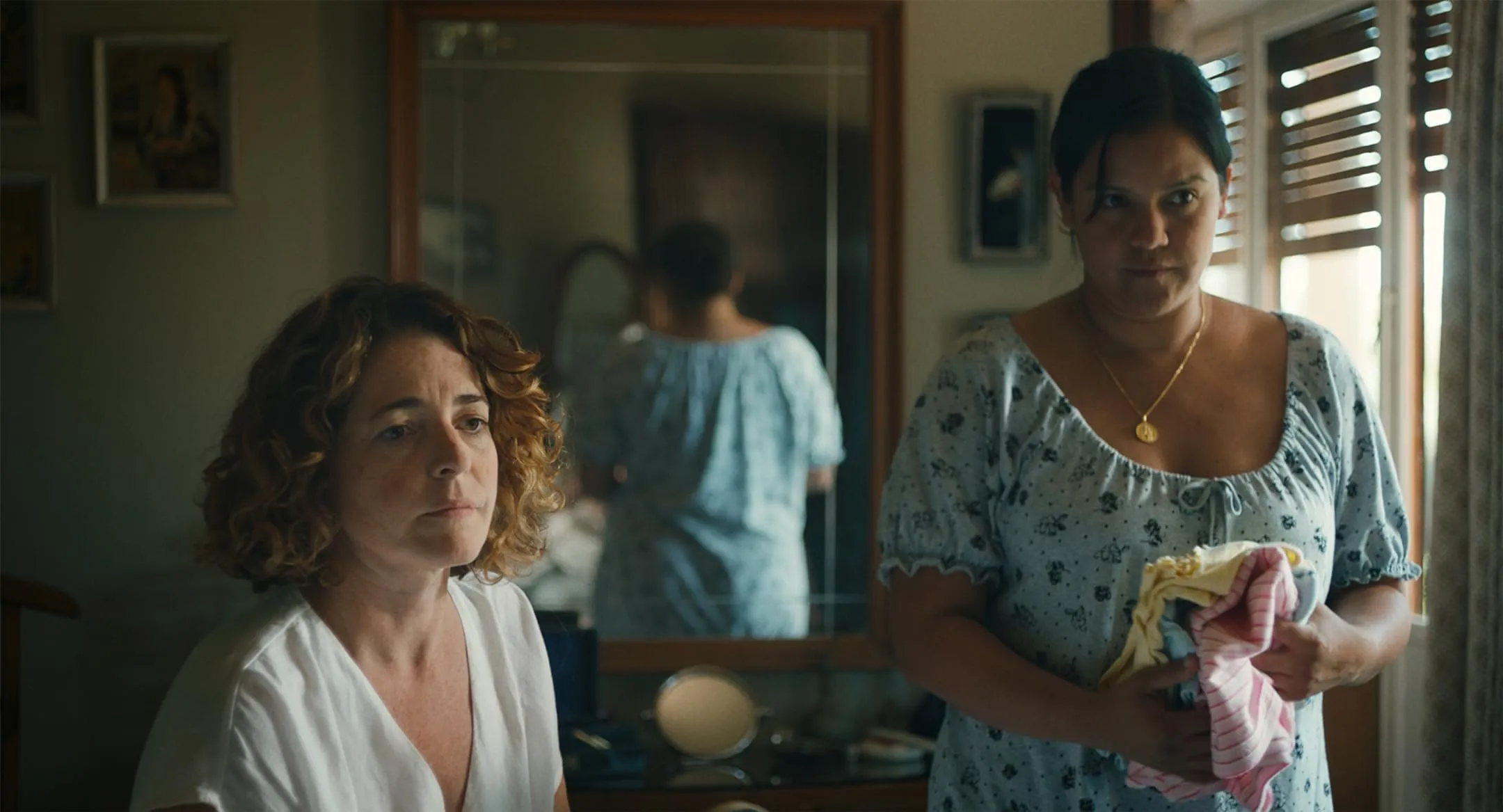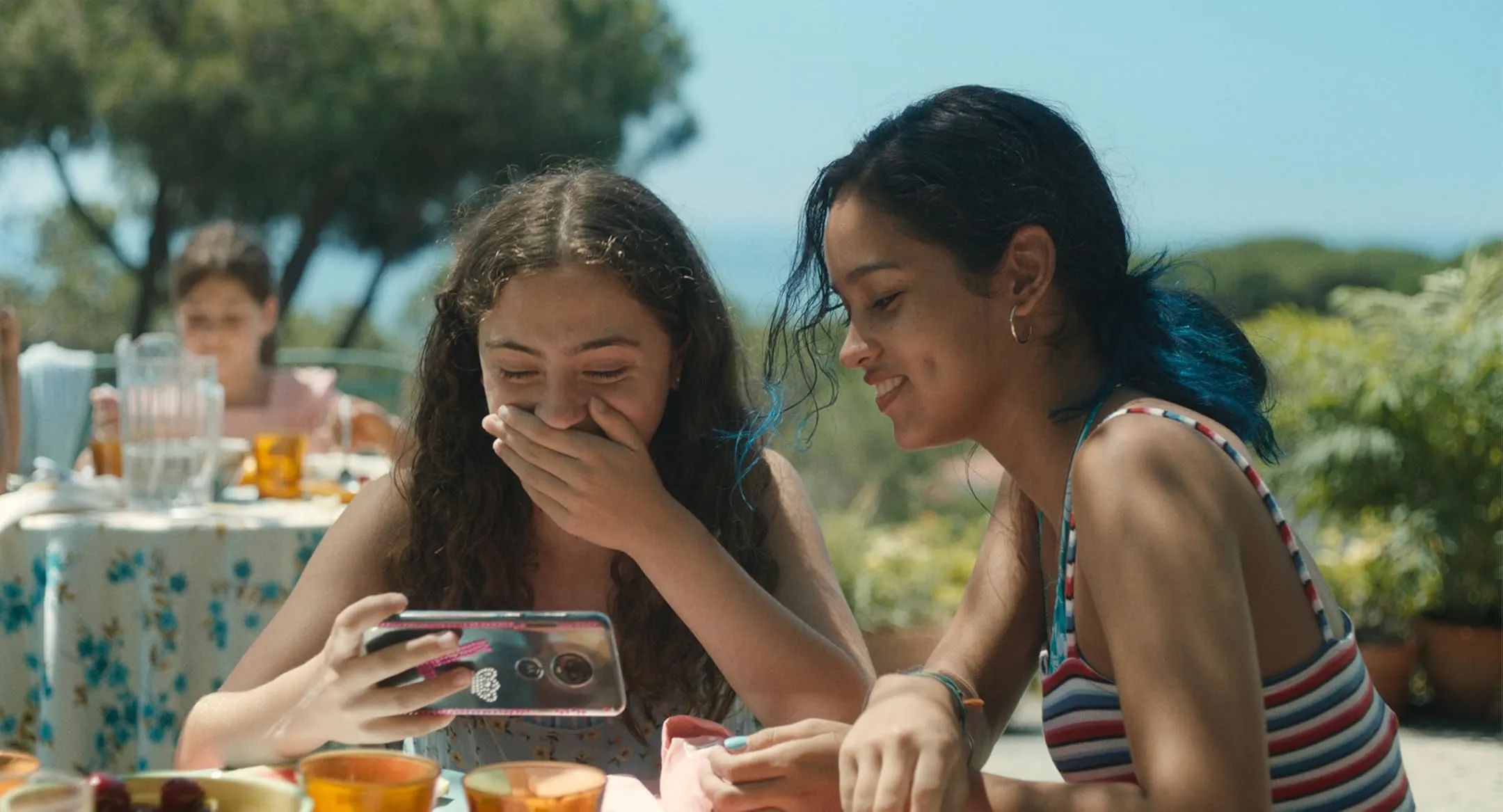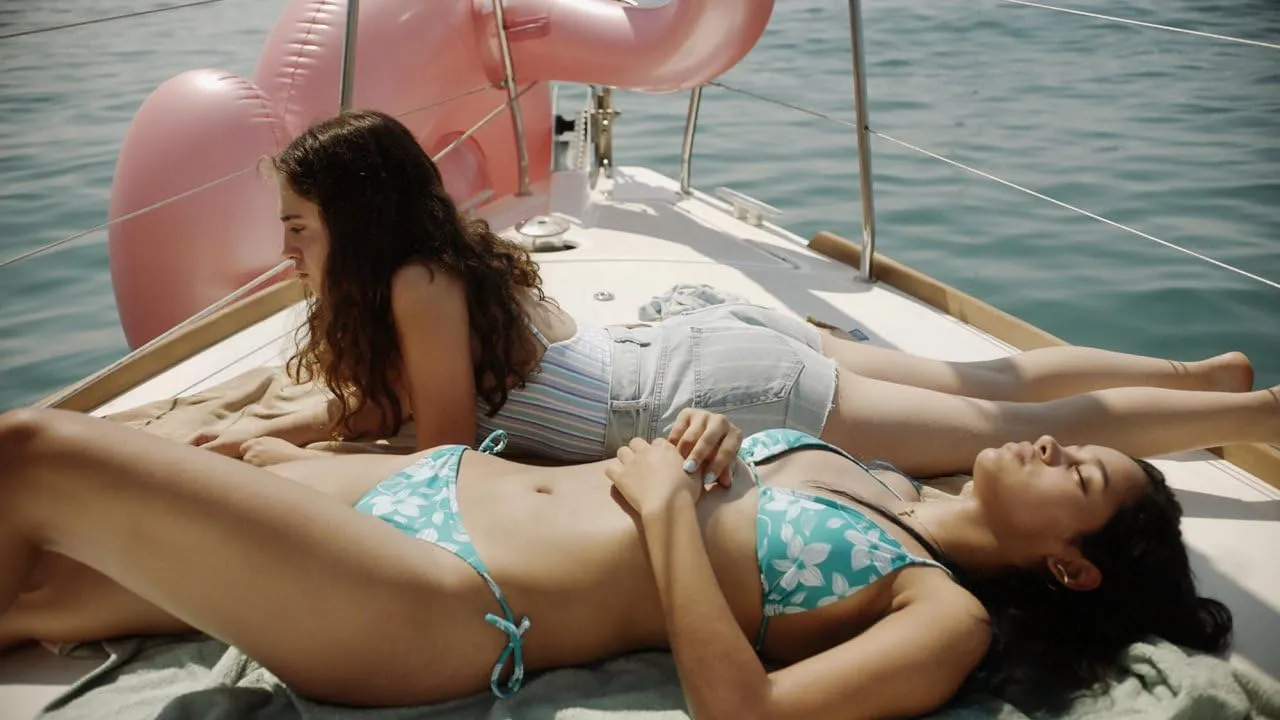Clara Roquet’s debut film Libertad takes place along the rugged coast of Spain’s Costa Brava, where gentle waves lap at beaches dotted with crags. It’s here two adolescent girls from different worlds, Nora and Libertad, form an unlikely bond one summer that shines light on matters both profound and fleeting.
Nora, around 15, belongs to a comfortable Barcelona family that owns a seaside villa. However, she’s starting to feel displaced there as childhood recedes. Meanwhile, Libertad recently arrived from Colombia to reunite with her mother Rosana, who works as a caretaker for Nora’s aging grandmother. Headstrong Libertad fascinates Nora and inspires her to glimpse life beyond the villa’s gates.
Roquet immerses viewers in these characters’ experiences with sensitivity. Through languid scenes wielding subtle significance, we see how fleeting pleasures like new friendship can momentarily ease pains of loss, change, and social limits. But we also witness humanity’s complexities as tensions from varying backgrounds interact. The film debuted to acclaim at the 2021 Cannes Film Festival, with Roquet exhibiting early mastery at illuminating life’s intricacies.
This review will closely examine the film’s atmospherics, the relationships at its heart, and reflections on burgeoning selfhood its journey arouses. By the glistening shore, Libertad and Nora discover connections that, like the tides, ebb and flow yet leave marks not soon forgotten.
Life’s Transitions by the Sea
Set along Spain’s beautiful Costa Brava, Libertad centers around two young girls on the cusp of change. Fifteen-year-old Nora belongs to a well-off Barcelona family vacationing in their seaside villa. But she’s starting to feel displaced, wondering what lies beyond the gate. Meanwhile, Nora’s grandmother Angela suffers from Alzheimer’s and is cared for by Rosana, a Colombian migrant worker.
When Rosana’s headstrong teenage daughter Libertad arrives after years apart, Nora is intrigued by the free-spirited new presence. Though from different worlds, the girls form an unlikely bond. Through Libertad’s example, Nora gains a glimpse outside her insular family life. But their friendship also unveils societal divisions the naive Nora was previously unaware of.
We see these dynamics play out over the film. Nora, still clinging to childhood yet eager to grow up, finds a role model in the worldly Libertad. But their blossoming relationship causes tension, as Nora’s reserved mother disapproves. Rosana too struggles in her duties, missing her home as she cares for the ailing Angela.
As the summer passes, Libertad inspires Nora to open her eyes to life’s harder truths. But their time together is fleeting. Gradually, Nora gains perspectives that challenge her once idealized view of family. She also witnesses how precarious human connections can be when crossed by divides in class, culture, and circumstance. By the film’s end, Nora has taken her first steps into adulthood thanks to the guidance—and inevitable departure—of her new friend.
Capturing Moments Through Gentle Vision
Clara Roquet brings such sensitivity to Libertad. Her natural directing style soaks in the rich atmospheres and draws out nuanced performances. Alongside Gris Jordana’s cinematography, they craft a film that feels vivid yet quietly profound.
Jordana’s camera flows gently, finding poetry in daily moments. Scenes play out with breathable pacing and exquisite detail. Whether capturing the family home’s atmosphere or the girls’ expressions in summer’s fading light, visuals immerse you yet leave space for reflection.
Nothing feels forced or overdone. A simplicity guides the craft, letting the story’s intricacies emerge unrushed. In a tender exchange between Nora and her grandmother, we see Angela’s memories surface through subtleties in Peña’s performance, magnified not by manipulation but cautious observation.
Physical settings also take on layered significance. The villa by the sea eloquently symbolizes shifting realities for its residents. As the holiday nears its end, one long take surveys its rooms with a twinge of melancholy, tracing the changing tides their lives will now feel.
Libertad and Nora’s visual chemistry, too, speaks beyond words. Whether bonding at the pool’s edge or drifting apart at the story’s close, their relationships unfold as much through fleeting contact as dialogue. Feelings are conveyed through the minute rather than embellished for obvious impact.
Under Roquet and Jordana’s sympathetic touch, Libertad’s inward journey gains striking yet tender form. Their visual care is a gift for any viewers wishing to immerse deeply in this film’s moving exploration of life’s poignant passages. Through her gentle vision, Roquet honors the depth and nuance innate to humanity’s most meaningful moments.
Captivating Young Talent at the Heart of Libertad
The performances in Libertad are undoubtedly what bring Roquet’s vision to life. At the core are Mara Morera and Nicolle Garcia, capturing the nuanced relationship between Nora and Libertad with impressive grace.
María carries much of the film through observation alone. In her eyes and deliberate movements, we see Nora silently questioning her world. There’s a natural shyness too, until Libertad’s magnetism draws her out of her shell. Yet María ensures Nora’s vulnerability never overshadows her intelligence. We understand every thought passing behind those expressive features.
Beside her, Nicole brings Libertad’s free spirit swirling onto the screen. She makes rebellion and carelessness feel irresistible. Yet her performance hints at deeper loneliness beneath the bravado. It’s a complex portrayal that, along with Mar’s, forms the beating heart of this story.
Their on-screen chemistry feels so genuine, every glance and casual touch resonating. Through the girls’ relationship, we see nuanced portrayals of femininity, from Nancy redefining herself against Teresa’s stagnation to Libertad asserting her independence.
The supporting roles are just as rich. Nora Navas imbues Teresa with quiet melancholy, the cracks in her stability chillingly apparent. Meanwhile Vicky Peña is heartbreaking as Angela, memories flickering across her face like projections on water.
Minor roles too feel vivid, like Carol Hurtado bringing spirit and compassion to Rosana. Each brings these women to life as fully realized and moving characters.
It’s a testament to Roquet’s direction that she draws out such profound work from her cast, especially from newcomers like Maria. Their acting elevates the intimate story and fragile emotions at its heart. While the film will linger through its atmosphere and themes, it’s truly the captivating performances of this young talent that make Libertad an unforgettable viewing experience.
Windows to the World
Libertad touches on so many universal themes as its protagonists come of age. At the heart is adolescence—that time of profound change. We see it through Nora, teetering between childish games and adult curiosities, her understanding of the world expanding.
A key part of this is her relationship with Liberty. Through her more worldly friend, Nora glimpses life outside the villa’s gates. Libertad shatters preconceptions, showing privilege depends on circumstance of birth. They bond over shared interests, yet their differences in terms of social class become clearer.
Roquet paints a nuanced picture of privilege, from how easily the wealthy guests discard servants to kinder bonds formed across divides. She spotlights immigration too, following mother and daughter through separation and reunion. Their story mirrors that of families even today seeking better prospects abroad.
Transition is another theme, like the bittersweet passages of time. Grandmother Angela’s dementia transforms her from commanding matriarch into a lost soul. Teresa must accept her mother’s decline just as Nora leaves childhood. Even their idyllic villa shows signs of decay.
Family dynamics play out too as the women negotiate change. Teresa struggles in her role while Nora questions the ideals of motherhood. Cracks in the facade hint that nothing lasts, an unsettling realization for the young.
Subtly, loss emerges—of youth, independence, and illusions of permanence. Yet new connections form as the girls find solace in each other across barriers. Their friendship, still unfolding, offers hopeful signs that we can understand each other despite life’s complexities.
Overall, Libertad captures the poignant beauty and uncertainty of its moments. With sensitivity, it shares insights into growing pains universal to its audience and early glimpses of the wider world.
Windows Into Adolescence
Libertad takes an insightful approach by viewing its themes through Nora’s eyes. As a teenager on the cusp of change, her perspective makes for a pristine lens. We experience her summer unfolding naturally, filming without artificial construct.
Nora observes more than acts, absorbing experiences that will quietly shape her. Whether family dinners or nights out with Libertad, we share her perspective. Her wide-eyed innocence viewing the world brings poignancy. Yet Roquet crafts Nora with complexity—we notice shifts in how she carries herself.
Subtly is part of Libertad’s power. Complex issues surface through everyday scenes, not exposition. We notice social strata more through glances than declarations. Nora’s awareness of privilege grows as natural as her changing frame of mind.
Roquet presents teenage experiences with nuanced authenticity. She finds poetry in fleeting moments most impacting youth—a chance meeting, dancing with a friend, quiet chat with Grandma. Simple scenes resonate with a deeper understanding of their emotional weight.
Nora’s viewpoint enhances our own memories—we recall how formative small occurrences seemed at that age. Yet Roquet avoids direct parallels to maintain her character’s singularity. Instead, Nora serves as a window into that liminal life phase we all journeyed.
With gentle artistry, Libertad peers into one girl’s rites of passage and finds universal insights into adolescence. Through Nora’s eyes, we grasp its complex beauty anew.
Windows into the Soul
Clara Roquet’s debut work Libertad quietly cements her status as a filmmaker of profound insight. With natural flair, she guides us into her characters’ inner lives, finding truth in barely uttered words and fleeting glances. This subtle mastery affirms why she deserves acclaim.
Nora and Libertad swell from her pages as authentic, endearing souls you feel you know. Maria Morera and Nicolle Garcia breathe life into them with perfect chemistry. Their work speaks volumes where lines are sparse, emotion carrying the story’s current. Awards voters would be wise to laud these leading ladies.
Libertad swells with truths beyond its plot. It’s a film that lingers, reflections of its scenes lingering in your mind. Roquet achieves this by filtering big themes like friendship and family through small, intimate moments. Her direction stays light yet reveals hidden depths.
This makes her debut all the more impressive. With such a promising start, Roquet surely has a bright future. As she refines an already distinctive style, her films will continue opening windows into the hidden places we all inhabit. For now, Libertad lays strong foundations deserving great success, announcing a talent to follow with keen anticipation. Some directors make lasting debuts—this one certainly does.
The Review
Libertad
PROS
- Nuanced exploration of friendship, family, and adolescence
- Outstanding performances from the leads
- Masterful direction with delicate handling of themes
- Beautiful cinematography that enhances atmosphere
- Subtle yet impactful storytelling focused on character
CONS
- May not have mass market appeal due to subdued style
- Some themes, like class differences, could be explored more.
- Ending leaves some relationship resolutions ambiguous.




















































Discussion about this post